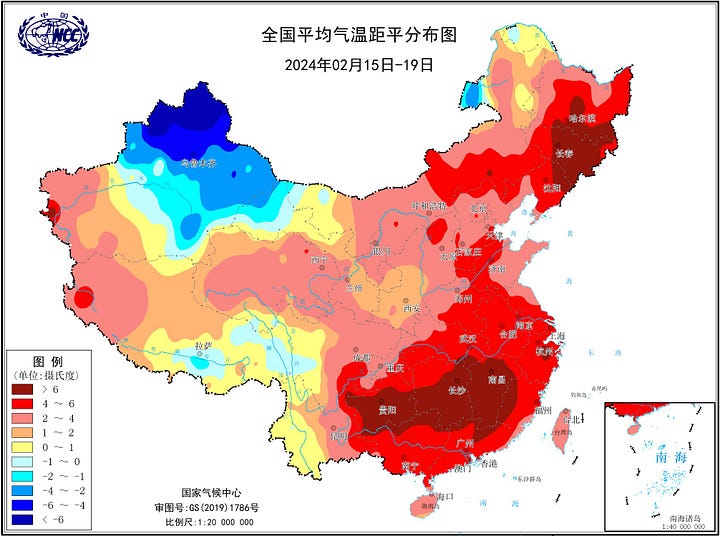China's Growing Season Threatened By Historic Cold; Deadly Avalanche In France; + Another 'Swing' For The U.S.--From Heat To Flash Freezes
China's Growing Season Threatened By Historic Cold
China's National Meteorological Center has issued its highest alert for cold temperatures for the third straight day after an Arctic Blast returned temperatures to historic lows.
Across the country, more than 400 weather stations broke their low temperature records for late February.
As reported Monday, the city of Shanghai experienced freezing rain for the first time its 150 years of meteorological record keeping. Even the Shanghai Tower iced over:
China's historic lows and snows aren't going anywhere anytime soon, either. As per official forecasts, temperatures are expected to hold below the seasonal norms across much of the country well into March.
Such cold during the onset of the spring growing season is threatening vegetable and oilseed crops, a situation that has prompted the government to dispatch experts to support farmers.
China has big plans to boost homegrown produce so as to reduce reliance on imports and bolster its food security. Already though, the production of crops like cucumbers and capsicums was expected to fall by some 20% this year.
Seemingly prepared for such a cold outbreak, the Chinese Academy of Agricultural Sciences has deployed 40 teams of experts across the country to assess and minimize damage to spring vegetable crops. The teams are monitoring weather changes as well as providing technical advice to farmers.
"The country has continued to experience extreme meteorological disasters and several sudden temperature drops, which has had a great impact on our vegetable production," said the academy.
Oilseed crops—such as soybeans, rapeseed and peanuts—are also suffering serious damage due to freezing rain and snow across the top producing provinces of Hunan and Hubei, according to a report by China-based commodity consultancy Mysteel.
Up to 30% of the rapeseed crops could be damaged or become more susceptible to fungal diseases, concluded the report.
Additionally, heavy snowfall is impacting greenhouses and livestock production in provinces like Shandong and Henan, while low temperatures and rain could affect winter wheat in southern China.
Despite the proclamations of 'ever-hottering global boiling', China's cold outbreaks are increasing in both regularity and intensity.
The country has food security as a key goal, but a trio of Arctic Blasts and extreme 'weather whiplash' are lowering yields — the latest blast comes after record cold and blizzards hit in early-Feb, and before that in late-January.
Swings from anomalous heat to blistering cold are fully expected, and are forecast to intensify moving forward. China knows this. Their scientists have been warning of it for years.
Where real world observations have forced the AGW Party to twist and change its once simple-to-understand theory (of linearly rising temperatures and decreasing cold outbreaks), the 'low solar activity' theory still stands untouched (and "unadjusted").
Below is a look at China's recent temperature swings, from anomalous heat (Feb 15 -19) to all-encompassing cold (Feb 21 - 25):


The significance of this setup cannot be understated, nor should its true attribution be propagandized away.
Rising atmospheric CO2 levels have no part to play in these violent swings between extremes. Instead they are linked to low solar activity, to the cumulative affect of years of reduced output, via a weakening of the jet streams (until I'm blue in the face).
Deadly Avalanche In France
A massive avalanche hit the Val d’Enfer valley, in the Sancy Massif, France on Sunday afternoon.
Keep reading with a 7-day free trial
Subscribe to Electroverse Substack to keep reading this post and get 7 days of free access to the full post archives.






